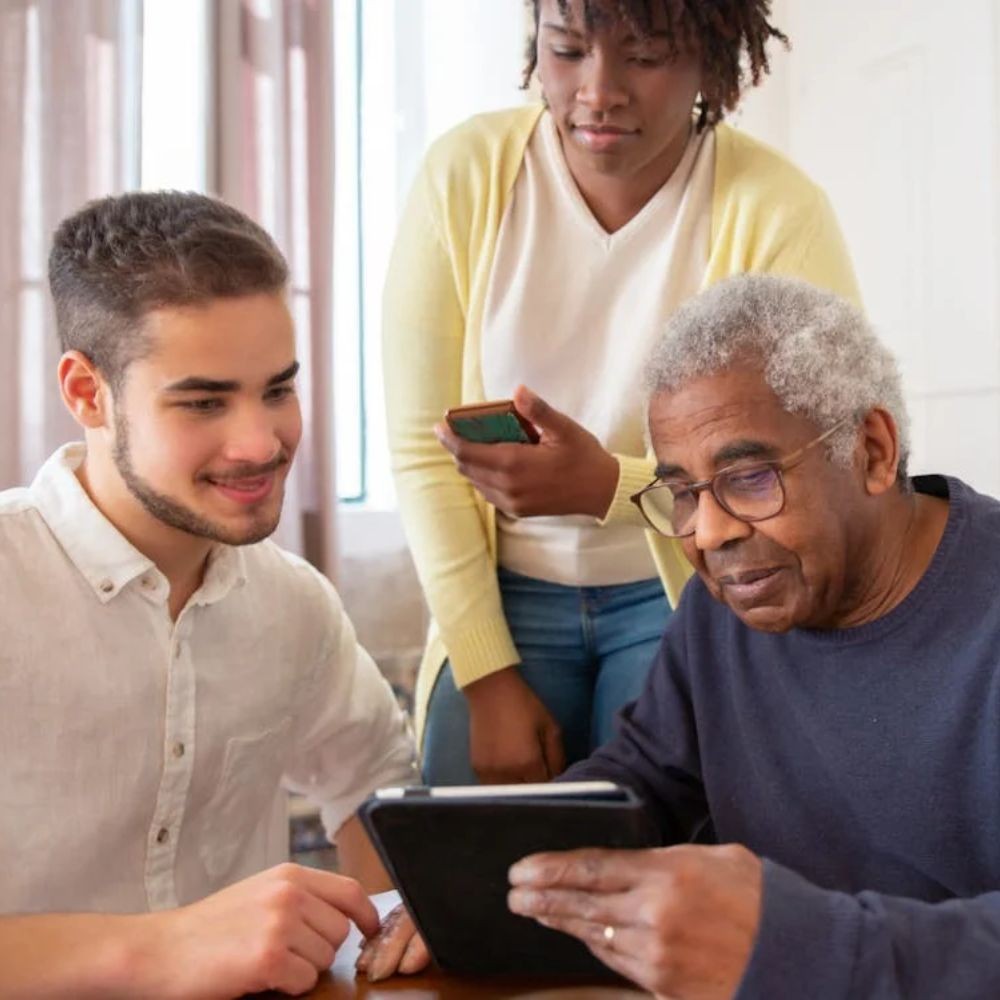Communication in Relationships: Unlocking the Path to Healthy Connections
t is extremely essential to establish good communication in relationships to strengthen the bond. So here are some tips to encourage meaningful conversations.

Fruitful and healthy communication is the lifeblood of any successful relationship you see around, akin to a secret language of love that draws a connection closer. It unlocks a world of profound understanding where inside jokes and heartfelt conversations flourish. Like a superpower, good communication in relationships empowers us to connect deeply, comprehend one another, and conquer challenges hand in hand with our partners. It is the key to fostering a strong and fulfilling bond where love and understanding flow effortlessly. So, as we embark on this journey to explore the profound impact of interaction in relationships, let us venture into the realm where we uncover the secrets of why communication is truly the heartbeat behind every thriving relationship.
Why Is Communication in Relationships Important?

The interpersonal exchange of words in relationships makes for an essential ingredient that can either make or break any bond. Whether it's with our partners, family members, friends, or colleagues, effective communication lays the foundation for understanding, connection, and growth.
Here is a list of some benefits of communication in a relationship:
1. Communication Builds a Foundation
Imagine a relationship as a house being constructed. Communication acts as the solid foundation upon which this house is built. Just like a sturdy foundation supports the entire structure, effective communication provides the groundwork for a strong and lasting relationship. So, if a couple always takes the time to talk and actively listen to each other's perspectives, they are definitely leading toward a healthy connection. Such a scenario will allow them to openly express their thoughts, emotions, and needs without fear of judgment or rejection.
2. Communication Plays a Crucial Role in Conflict Resolution
Having effective communication in relationships has always been a trusty sidekick, helping people navigate conflicts with ease. It allows you to express your desires, understand each other better, and find creative solutions that make everyone happy. So, if you and your friend are stuck in a tiff over what course of action to be taken over a situation, you may resolve the issue amicably with the help of your communication superpowers.
3. Communication Nurtures Trust And Transparency

Relationship dialogue cultivates utmost faith and transparency. When partners communicate openly, sharing their thoughts, fears, and vulnerabilities, trust is established. Honesty and transparency create a safe space where both individuals feel comfortable being their authentic selves, fostering a strong sense of security within the relationship. They know they can rely on each other, confide in one another, and face challenges as a united team.
4. Communication Promotes Growth
Communication serves as a catalyst for growth in meaningful relationships, propelling individuals and couples forward on their journey of self-improvement and personal development. It acts as a nurturing soil in which seeds of growth can take root and flourish. When a couple communicates openly and honestly, they create an environment that encourages learning and self-reflection. By sharing their thoughts, dreams, and aspirations, they inspire each other to explore new ideas, challenge old beliefs, and strive for personal growth.
5. Communication Leads to Increased Intimacy

When partners engage in open, honest, and authentic communication, they create a safe and trusting environment where emotional closeness can thrive. By openly discussing desires, boundaries, and preferences, they can explore new experiences, enhance pleasure, and establish a strong sexual connection. If they get to empathize with one another, couples can truly comprehend each other’s needs, desires, fears, and aspirations, fostering a profound sense of intimacy.
6. Communication Fosters Increased Sense of Affection
When partners tend to engage in open and heartfelt communication, they create opportunities to express love, gratitude, and admiration for one another. By vocalizing their affectionate feelings, couples validate and reinforce their emotional bond, leading to a deeper sense of belonging. Through verbal expressions of appreciation, partners can acknowledge and recognize each other's efforts, strengths, and qualities. This verbal validation reinforces the feeling of being valued and cherished, generating a stronger sense of connection and affection. Moreover, communicating appreciation also enhances positive emotions and contributes to a more positive relationship atmosphere.
How to Communicate in a Relationship?
To bridge gaps in the event of a misunderstanding and overcome our most challenging obstacles, we all require open dialogue to take place in a relationship. In light of this, we bring you here a few ways to communicate in a better way with your companion that you might find helpful.
1. Active Listening
Active listening plays a crucial role in constructive interaction. It involves not only hearing the words that your partner is saying but also paying attention to their tone, body language, and emotions. When you actively listen, you show genuine interest in understanding your partner's perspective, thoughts, and feelings. By actively engaging in the conversation, you can clarify any points of confusion, ask relevant questions, and seek further understanding. This ensures that both you and your partner are on the same page, reducing potential conflicts and promoting effective problem-solving.
2. Use “I” Statements

When you use "I" statements, you take ownership of your emotions and experiences. This approach helps to avoid blaming or accusing your partner, creating a more open and non-confrontational atmosphere. By focusing on your own feelings and perceptions, you encourage your partner to listen and empathize with your perspective. "I" statements also promote personal responsibility and accountability. Instead of placing the burden solely on your partner, you express how their actions or words affect you. This encourages both individuals in the relationship to take responsibility for their own emotions and behavior, fostering a sense of mutual respect and cooperation.
3. Non-verbal Communication
Nonverbal communication plays a significant role in communication within a relationship, often conveying messages that words alone cannot express. It includes gestures, facial expressions, body language, tone of voice, and other subtle cues that contribute to the overall meaning of a conversation. One of the key aspects of nonverbal communication is that it helps to convey emotions and attitudes. For example, a warm smile, a gentle touch, or maintaining eye contact can communicate affection, support, and love without uttering a single word. These nonverbal cues create a sense of connection and intimacy, enhancing the emotional bond between partners and better communication in relationships.
4. Timing And Environment
When it comes to effective communication within a relationship, timing, and environment are key factors that influence the nature and significance of our interactions. Timing refers to choosing the right moment to initiate a conversation or discuss a particular topic. It involves considering factors such as your partner's emotional state, availability, and receptiveness. Picking an appropriate time ensures that both you and your partner are mentally and emotionally prepared to engage in a meaningful conversation. And at the same time, the physical setting and atmosphere can significantly impact the comfort level and openness of both partners. Finding a quiet and private space where you can have uninterrupted conversations allows for better concentration and connection.
5. Be Respectful And Kind

Being kind and respectful sets the tone for constructive and meaningful interactions, creating an environment where both partners feel valued, heard, and understood. Kindness and respect create a foundation of trust and emotional safety. When partners communicate with kindness, they show care, empathy, and consideration for each other's feelings and well-being. This promotes a sense of security and openness, allowing both individuals to express themselves honestly and authentically.
6. Express Appreciation
Expressing appreciation conveys recognition and gratitude for the efforts, qualities, and contributions of one's partner. It involves acknowledging and valuing the positive aspects of the relationship, such as acts of kindness, support, understanding, and love. By vocalizing appreciation, partners feel seen and validated, fostering a sense of emotional connection and affirmation. When we express appreciation, we create a positive feedback loop within the relationship. It encourages a cycle of giving and receiving, where both partners actively notice and acknowledge each other's efforts and positive qualities. This strengthens the emotional bond and builds a foundation of trust, respect, and mutual admiration.
7. Seek Understanding
When both partners in a relationship are committed to seeking understanding, it fosters a deep sense of connection, trust, and intimacy. Seeking to comprehend the other person shows respect and validation for their experiences and perspectives. It shows that you value their thoughts and opinions and are willing to make an effort to acknowledge and grasp their thought process. By doing so, you create a safe and supportive environment where open and honest communication with your partner can thrive. This helps to build a strong foundation for a healthy and satisfying bond.
8. Avoid Mind-Reading
Mind reading, as a way of intimate relational discourse, can create misunderstandings and lead to unnecessary problems. It involves assuming you know what your partner is thinking or feeling without them explicitly telling you. However, this approach is unreliable because each person has unique thoughts and emotions. It is obviously better to practice open and honest communication, actively listen to your partner, and seek clarification when needed. This will foster understanding, trust, and a stronger connection in the relationship.
9. Practice Empathy And Compromise
By combining empathy and compromise in your communication, you create a harmonious and supportive relationship. Empathy helps you understand your partner's emotions, motivations, and concerns, allowing you to respond in a compassionate and considerate manner. It encourages active listening, validating your partner's feelings, and avoiding judgment or dismissiveness. This promotes open and honest communication, as your partner feels safe to express themselves.
Compromise, on the other hand, enables effective problem-solving. It requires actively seeking common ground and finding solutions that accommodate both individuals' perspectives and needs. Through compromise, you demonstrate a willingness to prioritize the overall well-being of the relationship rather than focusing solely on individual desires. This cultivates a sense of teamwork and collaboration, where both partners feel valued and involved in decision-making processes.
How to Improve Communication in Romantic Relationships
Love is a thrilling roller coaster ride, filled with ups, downs, and unexpected twists. And just like any adventure, effective communication is the key to a successful journey. But who said improving communication in romantic relationships has to be a dull affair?
Here, we bring you playful strategies and communication tips for couples, ensuring that your conversations soar to new heights of laughter, understanding, and joy.
1. Practice Mindful Listening
Practicing mindful listening allows you to truly connect with your partner as you tune in to their every word, gesture, and emotion. You become a master at picking up the subtle cues, like a secret language only the two of you share. By giving them your full attention and focusing on what they are saying, you gain insight into their world. This not only deepens your understanding of each other but also shows that you value and respect what your partner has to say. This understanding, in return, fosters empathy, compassion, and a deeper connection between you both.
2. Establish Regular Check-ins

By combining empathy and compromise in your communication, you create a harmonious and supportive relationship. Empathy helps you understand your partner's emotions, motivations, and concerns, allowing you to respond in a compassionate and considerate manner. It encourages active listening, validating your partner's feelings, and avoiding judgment or dismissiveness. This promotes open and honest communication, as your partner feels safe to express themselves.
Compromise, on the other hand, enables effective problem-solving. It requires actively seeking common ground and finding solutions that accommodate both individuals' perspectives and needs. Through compromise, you demonstrate a willingness to prioritize the overall well-being of the relationship rather than focusing solely on individual desires. This cultivates a sense of teamwork and collaboration, where both partners feel valued and involved in decision-making processes.
How to Improve Communication in Romantic Relationships
Love is a thrilling roller coaster ride, filled with ups, downs, and unexpected twists. And just like any adventure, effective communication is the key to a successful journey. But who said improving communication in romantic relationships has to be a dull affair?
Here, we bring you playful strategies and communication tips for couples, ensuring that your conversations soar to new heights of laughter, understanding, and joy.
1. Practice Mindful Listening
Practicing mindful listening allows you to truly connect with your partner as you tune in to their every word, gesture, and emotion. You become a master at picking up the subtle cues, like a secret language only the two of you share. By giving them your full attention and focusing on what they are saying, you gain insight into their world. This not only deepens your understanding of each other but also shows that you value and respect what your partner has to say. This understanding, in return, fosters empathy, compassion, and a deeper connection between you both.
2. Establish Regular Check-ins

Just like a well-planned road trip, regular check-ins provide a chance to assess the map of your relationship, ensuring you're still heading in the right direction. You'll have the opportunity to discuss any roadblocks or detours you may have encountered, adjusting your GPS as a team. These check-ins provide dedicated time for both partners to come together and have intentional conversations. By setting aside this time, couples can discuss their individual needs, desires, and concerns openly and honestly. Regular check-ins also help to build trust, as they create a safe space for vulnerability and emotional expression. They allow partners to address any issues or conflicts that may arise, preventing them from festering and potentially causing larger problems down the line.
3. Try Stepping Into Your Partner’s Shoes
When you attempt to put yourself in your partner’s shoes and practice empathy, you strive to understand and share the feelings of your companion. It allows you to put yourself in their shoes and see the world from their perspective. By cultivating empathy, you create an atmosphere of compassion, support, and validation. When your partner feels understood and acknowledged, they are more likely to open up and express themselves in their true selves. Empathy helps to break down barriers and build trust, as it shows that you genuinely care about their emotions and the experiences they have been through.
4. Inject Humor
If you are trying to figure out how to fix communication issues in a relationship, injecting humor is the best way to lighten the situation and strengthen the bond between partners. Humor acts as a natural icebreaker, easing tension and diffusing conflict. It allows you to approach sensitive or challenging topics with a lighter touch, making it easier to express your thoughts and feelings without fear of judgment or defensiveness. Humor also promotes perspective-taking, as it encourages both partners to see situations from different angles and find common ground. It fosters a sense of playfulness and spontaneity, injecting energy and excitement into your interactions.
5. Use Technology Creatively
In today's digital age, technology offers various tools and platforms that can enhance connection and deepen intimacy. Creative use of technology allows couples to stay connected even when physically apart. Through video calls, voice messages, or texting, partners can maintain constant communication, bridging any distance that may separate them. It provides opportunities for shared experiences, such as watching movies together being on separate screens, or playing online games as a couple.
Technology also provides an outlet for creative expression, allowing partners to send personalized videos, digital artwork, or playlists that reflect their love and appreciation for each other. Moreover, the use of technology can bring an element of surprise and spontaneity, such as sending unexpected messages or arranging virtual surprises to keep the romance alive.
6. Engage in Active Learning

Active learning allows partners to explore different perspectives, gain insights, and expand their communication reserve. Attending workshops, reading books, or taking online courses together creates a shared learning experience, encouraging mutual growth and understanding. It opens up avenues for discussion, reflection, and practical application of what is learned. Actively learning together also promotes a sense of collaboration and teamwork, as couples work towards common goals and develop strategies to improve their communication in relationships.
7. Foster Openness
Openness creates a safe and non-judgmental space where couples feel comfortable expressing their thoughts, feelings, and needs. When both individuals are open with each other, it cultivates a culture of honesty and transparency. This allows for open dialogue and authentic conversations, where both partners can freely share their joys, fears, and concerns. By encouraging openness, couples can actually address issues promptly, avoiding misunderstandings or resentment that may arise from unexpressed thoughts or unmet expectations.
It also promotes growth and personal development, as individuals feel comfortable sharing their vulnerabilities and aspirations with their partners. Ultimately, it paves the way for vulnerability, essential for intimacy and fostering a deep sense of closeness in any relationship.
8. Seek Professional Help If Needed
Seeking professional help to improve your romantic bond is equally beneficial because it provides objective guidance, specialized knowledge, and expertise in addressing your relationship challenges. Therapists can offer a safe and neutral space for open communication, teach effective communication skills, and help you address unresolved issues. They can also provide prevention and early intervention, validate and support you throughout the process, and contribute to long-term relationship satisfaction and growth. Professional help empowers you to navigate challenges, deepen understanding, and build a stronger foundation for a healthier and more fulfilling romantic relationship.
The bottom line is that even though communication in relationships is undeniably important. It requires effort, patience, and a willingness to truly listen and understand one another. While challenges may arise along the way, the rewards of effective communication are invaluable. It is through open and honest dialogue that we build trust, deepen our connection, and navigate the ups and downs of life together. So, let's continue to work toward having meaningful talks in our relationships despite any challenges that may come. You never know; it might end up being the superpower keeping your relationship alive.
ALSO READ: 15 Pillars of a Happy And Fulfilling Relationship





 JOIN OUR WHATSAPP CHANNEL
JOIN OUR WHATSAPP CHANNEL













































